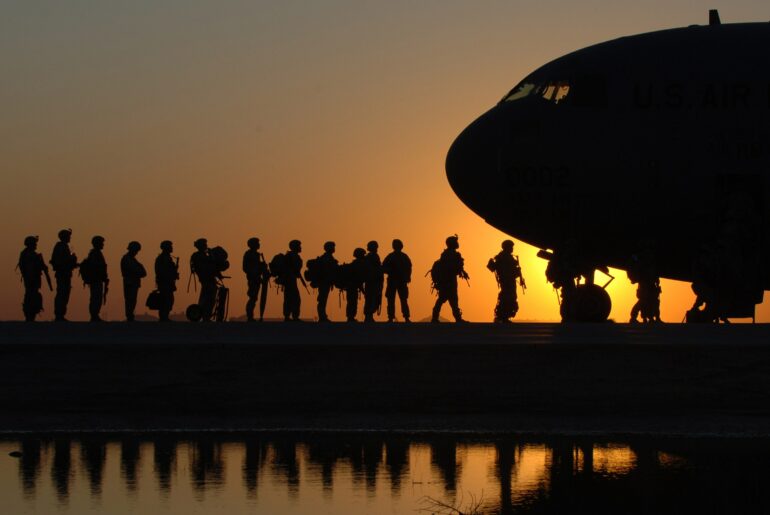It’s natural to feel uncertain when faced with the decision of what to do next in life. For veterans, navigating the grey zone between the end of service and the return to civilian life can not only feel unsettling, but also isolating. One pathway often considered post-military is to go back to school. To help veterans transition from soldier to student, we spoke with a former military member about how she overcame challenges upon returning home from deployment and succeeded in obtaining her college degree.
Elizabeth Hughes served in the New York Army National Guard for seven years. ”I chose to serve in the National Guard because it allowed me to return to my family and home after basic training,” says Hughes. While the National Guard permits enlisted members to hold part-time jobs and attend school while receiving training, the familiarity of civilian life may fade once a guardsman is called upon for active duty. Federal deployments may transfer guardsmen overseas for missions lasting 12 months or longer. The shock of moving between two vastly different cultures can take a toll on a soldier’s mental and emotional state.
“Transitioning back to civilian life was tough. I was in Kuwait for nine months and although I was able to talk with my family almost every day, it wasn’t the same. I wasn’t able to go home on leave while I was in the country.”
As Hughes soon discovered, life at home doesn’t pause for the family and friends a deployed soldier leaves behind. While she befriended other service members over the years, Hughes returned home to find her relationships with loved ones had changed.
“While I was on deployment, I made a couple of lifetime friends. I still keep in touch with a couple of them. One was actually a bridesmaid in my recent wedding. But that didn’t help when I arrived home, as they resided in different areas of the state. I tried to get back into the same routine that I was in when I left, but things weren’t the same. My family was different, my relationships were different, and my job prospects were different. I felt helpless a lot of the time and I relied on my friends from the military a lot.”
Back to school
Establishing a sense of normalcy post-deployment can be helpful to veterans transitioning to civilian life. For some, this includes education. To help prepare for her future outside of the National Guard, Hughes pursued a degree from Onondaga Community College. She offered the following advice for veterans adjusting to life as student:
“When it comes to returning to school, keep in mind that you have already accomplished much more in your life than most people dream about. You are not dumb, you are not stupid and you are not a failure. Keep in mind the Soldier’s Creed and keep your head up. Don’t let the people that are in your classes that are younger or older than you put you down. They don’t, and most of the time can’t understand everything you have been through because they haven’t experienced it themselves.”
Hughes also noted the importance of seeking out resources for veterans offered by your school.
“If you are going to a physical campus to take classes, ask if there is a Veterans Center. They can help guide you through which benefits to apply for and list the resources available to you. They treat you like family most of the time. Just remember you are not alone. There are more veterans out there that are going through the same thing.”
And don’t forget to research education benefits you may be eligible for. You can find information on available programs and scholarships by visiting the U.S. Department of Veterans Affairs’ website.
“Make sure you look into your GI Bill. There are several different ones available depending on your service. I would also Google any questions you may have. I found that I would be directed to discussion boards based on my questions and get the advice I needed. The one resource I found invaluable was contacting the people that were in charge of tuition assistance in my state. They can be very busy, but will get back to you when they can. They were able to help me navigate the different options I had.”
A new beginning
It’s not uncommon for veterans to pursue a career in a field similar to the job they held in the military. For Hughes, a career in public safety seemed like a natural fit.
“I started looking for full-time jobs once I returned from my deployment. When I left the military, I was a Specialist in the Military Police (31B). I am currently a New York State Certified Peace Officer. I work for NYS at the Office Of Mental Health as a Safety and Security Officer. I selected this career because it is very similar to what I did in the military and it has given me some satisfaction over what I do.”
If you’re a veteran considering going back to school, check out our College Search Tool. This free database allows you to search schools by field of interest and other qualities. Looking for a quick recommendation? Visit our College Discovery Center for short listings of schools separated by focus area.




